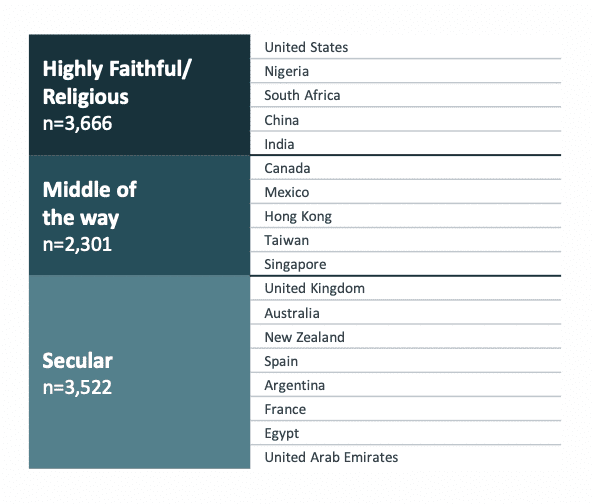 Major study reveals the public wants more faith media coverage but newsrooms are discouraged from covering religion. It is time for religious bloggers and mainstream media to collaborate.
Major study reveals the public wants more faith media coverage but newsrooms are discouraged from covering religion. It is time for religious bloggers and mainstream media to collaborate.
As a faith blogger since 2003 I have always had a mixed view of the mainstream media. Of course I have a lot of respect for journalists and the work they do in covering news. But often a lack of passion or expertise comes across and for many issues a good citizen journalist trumps someone writing copy on a tight deadline.
When it comes to matters of faith, my view has always been that the media simply doesn’t get it. When faith is mentioned at all in news reports errors are rife, and there appears to be little sympathy towards people of faith. In an effort in some cases to appear “unbiased” the faith aspects of many top stories are airbrushed out and religious news simply doesn’t appear to get the attention it deserves. This was certainly true in the coverage of the death of Queen Elizabeth the Great whose very real personal faith was conveniently ignored by many mainstream outlets. Since the Queen was the head of one of the World’s largest faith groups, the Anglican Communion, this silence was a major missed opportunity to counter the stereotypes that women are not welcomed in many religions as leaders.
In light of all this I was very interested to read the recent report of the The Inaugural Global Faith and Media Study which can be downloaded here.
The study interviewed journalists and members of the public from six different continents and had participants from all the World’s major religions, it also included agnostics and atheists.
The almost 9500 interviews led to a ranking of countries by how religious or secular they were based on how strongly participants identified with being a person of faith. The USA was one of the most religious countries, while the UK was one of the most secular.

Despite this clear range in how strongly people identify with a Faith, globally 74% said they were in some way affiliated with a specific religion or denomination, and 72% believe in a God or gods.
The majority of the World population (63%) showed a desire for good quality content on faith and religion, and just over half (53%) said that the media in their country deliberately ignores matters of faith in their output. 80% of people believe that the media uses religious spokespeople who are not sufficiently relevant.
Meanwhile the journalists who were interviewed admitted that they felt their outlet’s religious coverage was poor, inconsistent, and becoming more marginalised. They described largely secular newsrooms as a hostile environment for producing good faith based news items. They were concerned that specialist journalists no longer exist in most organisations leaving generalists to cover the news. The only time editors seem to want to cover religion is if there is a good salacious scandal to stoke up controversy.
Websites like the one I am writing on now are filling something of the gap in coverage from the mainstream media. 1 in 3 of the global population follow media sources which focus on matters of religion. This rises to 47% of people in the most religious countries.
There is a massive unmet demand for quality religious media content
The world’s population is looking for coverage of matters of faith that is diverse, in-depth, and not divisive. There is a concern among 43% of the World’s population that the current approach to religion by mainstream media creates unease and anxiety. The polarisation we see in so many issues massively affects matters of faith. Many people want to be able to better understand these complex issues and surely this would help to promote peace and harmony.
81% of the respondents believe that the media promotes stereotypes of religious people:
- Most religions are against homosexuality
- Religion promotes radicalism
- Religious clergy abuses children
- Women are not welcome as leaders
How could bloggers help?
When I first began blogging back in 2003 many of us felt a new era of mutual understanding was upon us. There was huge amounts of conversation between bloggers of different faiths and none. Suddenly we could interact and learn from real people with real lives who had very different perspectives from your own. No more tearing down straw men and women.
In the early days you would write about a matter of faith and within minutes another blogger would be in your comments explaining why you had misrepresented or not understood their view. A kind of mutual correction happened. I learnt so much from those of many different backgrounds. Some of the most widely read posts I have ever written come from that era and were birthed in collaboration which crossed boundaries of faith communities.
In writing two of my most popular posts ever I got help from some Muslim bloggers. The short series was a an attempt to help people from both communities understand how they agree and disagree with each other about Jesus. A similar desire to promote understanding rather than conflict drove my various theological spectrum posts and debates that I have been a part of.
Sadly even in the blogosphere we are now increasingly becoming isolated from each other and shepherded into separate self-reinforcing bubbles or echo chambers. Rarely do I hear from bloggers of other faiths any more. And the old days of written blog debates and back and forth seem to be almost over. Even here on Patheos “the premier online destination to engage in the global dialogue about religion and spirituality” , if we are brutally honest we have not so much a conversation as a multitude of monologues from a huge range of voices from all faiths and none.
I would love to see Patheos bloggers becoming part of the solution to the crisis in all forms of media communication about faith. We can surely produce more true interactive conversations in the form of blogs, and many of us could surely cross over into becoming more regular spokespeople and podcast conversation partners. Perhaps the mainstream media might even be persuaded to engage some of us to produce high quality content for them. Many bloggers would make great opinion columnists.
There are only a few outposts of the kind of engagement I believe is at the core of good religious media content whether in mainstream or on blog sites. One is the wonderful radio program, internet podcast, and more recently fellow Patheos column, Unbelievable?. Its host, Justin Brierley has for many years now quietly created content that genuinely educates by putting head to head people of different faiths or none. One example that could help diffuse the unnecessary hostility all too often seen between people of religious faith and those with none is the wonderful discussion between Richard Dawkins and Francis Collins. Justin offers advice in a recent article here on Patheos on how to find common ground across the religious divide.
What is Multi-Faith?
Multi-faith is collaborative engagement across various faith traditions, not sacrificing theological identity, but rather acknowledging that – even in the midst of our significant differences – we share a common humanity and value every person. #MultiFaith
— Multi-Faith Neighbors Network (@MultiFaithNN) June 13, 2022
Another example is the work of Bob Roberts and others in initiatives like the Global Faith Forum. Events like this are sometimes described as multifaith, promoting mutual respect for our diversity rather than more traditional interfaith efforts which have sometimes been criticised for pretending we all believe the same thing.
Faith Bloggers are already producing wonderful religious content which deserves a wider audience, the mainstream media has a vacuum that needs filling. Why don’t we collaborate?
Read More
Compassion fatigue, the Saviour complex, and Benevolent detachment
Dawkins vs Collins – amicable and engaging meeting of two great minds
A Muslim, a Christian, and a Jew walked into a church in Texas . . .
Eleven Things Muslims agree with Christians about concerning Jesus













